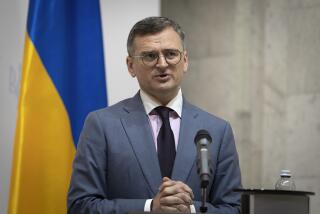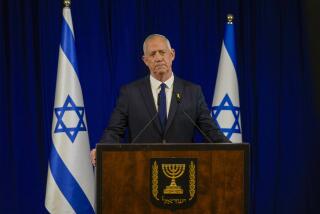The Latest Shuffle
- Share via
Under pressure from Boris N. Yeltsin, Soviet President Mikhail S. Gorbachev moved to replace more ministers and government officials. A look at who is in and who is out:
FOREIGN MINISTER: Advises on foreign policy
OUT: Alexander A. Bessmertnykh
President Gorbachev criticized him as being “quite passive” during the abortive three-day coup. Bessmertnykh, 57, a former ambassador to the United States, was not a member of the eight-member Emergency Committee that took control during the coup attempt.
IN: To be named
INTERIOR: Heads national police
OUT: Boris K. Pugo
Pugo, a member of the Emergency Committee, shot himself to death before police could arrest him.
IN: Viktor Barannikov
Barannikov, 50, formerly police chief in the Russian Federation, is a staunch supporter of Russian President Boris N. Yeltsin. The national police have been widely criticized for their role in the independence-minded republics.
DEFENSE: Heads armed forces
OUT: Gen. Mikhail A. Moiseyev
He had been promoted from chief of the general staff to acting defense minister Thursday in place of Gen. Dmitri T. Yazov, a coup plotter who was arrested.
IN: Col. Gen. Yevgeny Shaposhnikov
49-year-old commander of the Soviet air force, who refused to obey the orders of the coup committee. He named Lt. Gen. Pavel Grachev, commander of an airborne division, as his deputy. Grachev is chairman of the Russian Federation legislative committee on defense issues.
KGB: Heads secret police and intelligence agency
OUT: Leonid V. Shebarshin
On Thursday, Gorbachev had named him acting KGB chief to replace Vladimir A. Kryuchkov, one of the eight leaders of the coup. Shebarshin immediately banned Communist Party cells in KGB departments and among KGB troops.
IN: Vadim V. Bakatin
Bakatin, 53, was minister of the interior until December, 1990, when Gorbachev, under pressure from hard-liners, replaced him with Boris K. Pugo. The pro-reform Bakatin had notably restructured the police force, allowing Soviet republics to control police on their territory. This year, he ran against Yeltsin for the Russian Federation presidency and lost.
More to Read
Sign up for Essential California
The most important California stories and recommendations in your inbox every morning.
You may occasionally receive promotional content from the Los Angeles Times.













